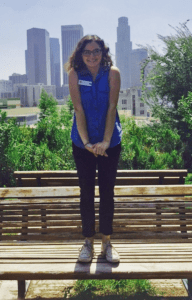Nell Wickstrom is the Manager of Academic Programs at the Partnership for Los Angeles Schools. She earned her Bachelor of Arts at DePaul University in Chicago and developed a passion for social justice by getting involved in communities through service work.
Growing up in suburban Chicago, in a conservative, primarily white, middle-class community, my sexual identity was straight by default. In fact, identifying as gay never even occurred to me as an option. No adults in my life talked about LGBTQ+ people, and I had no concept of what a queer adult looked, talked, or acted like. Between this omission of information by the adults in my life and the stereotypes and stigma spread through the media and school cafeterias, the one thing I knew was that it was inherently wrong, or at the very least inconvenient, to be queer.
When I went to DePaul University for my undergraduate program, naturally I was exposed to people, concepts, and ideas that I never knew existed. I was forced to confront the beliefs I had collected throughout my upbringing. For instance, the idea that racism was simply hateful discrimination against an individual based on the color of their skin evolved into an understanding of a complex system of oppression targeting people of color. I discovered that feminism had very little to do with growing out my armpit hair, and everything to do with being in support of women’s equal rights to enjoy the same liberties as men. I was exposed to the concept of intersectionality and the fact that one’s race, gender, sexual orientation, and various additional identities, all shape how they experience the world as a unique individual. Among countless other concepts, these learnings changed the way I saw the world and opened my eyes to just how much I did not know. Through all this discovery, eventually, I figured out: (you guessed it) I’m gay! With each of these discoveries, I wondered if my eyes might have been opened sooner had I come of age with adults in my life who had the care, knowledge, and insight to support my growth and learning around identity.

In my twenties (photo above), I found myself in a volunteer position for a national service program supporting students at a school in Los Angeles. It had been quite some time since I set foot in a middle school, let alone interacted with middle school-aged kids, and I often tried to connect with my students by tapping into my middle school self. I realized that, despite many years and many differences in our middle school experiences and identities, one aspect of their experiences was not dissimilar from my own: a general lack of supportive LGBTQ+ spaces and awareness of queer issues. Recognizing that this continued to be the reality for so many young folks made me feel frustrated and disheartened. Every young queer person’s experience is different depending on several factors, including the intersection of the various identities they hold, the friends and adults they are surrounded by, and the safety that is available to them which allows them to fully explore and be who they are. It is critical that LGBTQ+ youth have access to information and safe spaces to support their unique personal development, particularly at a time when queer media is more prominent than ever and, simultaneously, LGBTQ+ protections are being actively taken away. In this landscape, it is imperative to ask ourselves how these conflicting messages might impact our young people and how best we can support them.
I am immensely proud of the fact that so many schools in the Partnership for Los Angeles Schools’ network have clubs, such as the Gender & Sexualities Alliance Network (formerly known as the Gay Straight Alliance Network), that support LGBTQ+ students and provide a community of like-minded friends and allies. Under the sponsorship of Restorative Justice Coordinator Ms. Emily Grijalva, the Mendez High School GSA has advocated for the LAUSD Supports for LGBTQ+ Students and Families, which include adopting a more inclusive history textbook, competency training for school staff, gender-neutral restrooms on campus, and more. Ms. Grijalva shares:
“I believe an empowering space for LGBTQ+ students is one that nurtures their brilliance, affirms their identities, lets them express themselves freely, nurtures their joy and resistance, and uplifts their voices. I want Mendez GSA students to be truly happy and fulfilled – and know that they are loved and respected.”
As trusted adults in the lives of our young scholars, broadening our knowledge and understanding of LGBTQ+ history and current issues is not only crucial for their personal development, but enriching to the relationships we build with them. It’s fortunate that there are so many resources and opportunities available for adults to learn how to support LGBTQ+ youth, from general guidance on what allyship looks like, to ally trainings that provide a framework and space to hold a dialogue around how to best support our LGBTQ+ youth. It’s important for adults to actively seek out these opportunities and incorporate these spaces into our students’ daily lives. It’s in working together as a supportive school community that we will be able to effectively empower our young people to explore themselves and the world beyond.
The Mendez High School GSA continues meeting weekly via Zoom, and you can follow their journey on Instagram at MendezGSA.

